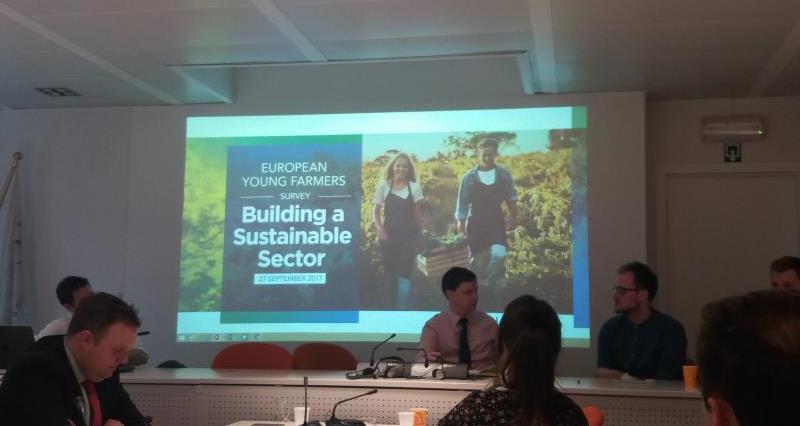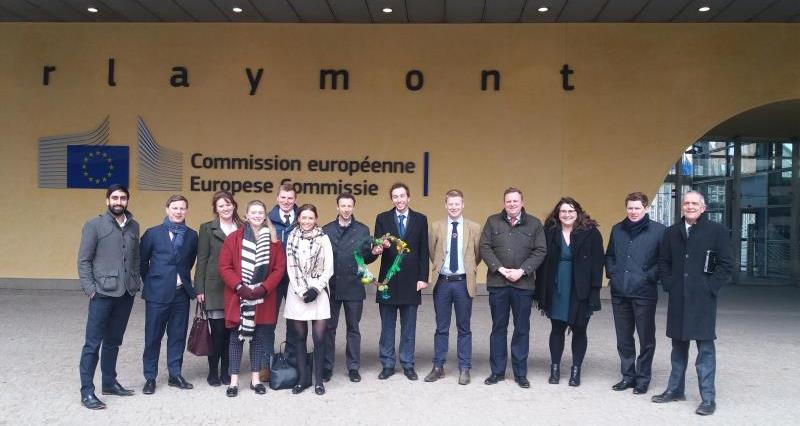They write:
We kicked off the day with a quick tour of the British Agriculture Bureau (BAB) office and a presentation from Katie Jarvis, NFU European Policy Adviser, about the work the BAB office carries out in Brussels.
The NFU performs a crucial role in Brussels; advising and lobbying the EU Commission and European MPs on the issues which matter most to British farmers. Established in 1972, the BAB office represents the NFU, alongside NFU Cymru, NFU Scotland, Ulster Farmers Union and the National Pig Association – it is the only remaining UK farming lobby to have a permanent base in Brussels, and is also housed in the same building as Copa Cogeca. The main purpose of the office is to gather information and intelligence to assist the NFU in lobbying the institutions of the European Union, since most laws affecting UK farmers are currently decided in Brussels, not Westminster.
Brexit
Following on from this, Brexit was a key theme throughout our next talk from Jannes Maes, President of CEJA; the European Council of Young Farmers. CEJA acts as a forum for communication and dialogue between young farmers and European decision makers, with their main objectives being to promote a younger and more innovative agricultural sector across the EU 28, and creating good working and living conditions for young people within farming. Jannes talked about the implications Brexit may bring to EU agriculture and the potential effects upon young people, he also expressed CEJA’s keenness to retain a close working relationship with Britain both throughout and beyond the Brexit process.

We then got some insight into the workings of Brussels from Breffni Carpenter, the Irish Agricultural Counselor from the Agriculture and Fisheries Council. He discussed some of the issues that Brexit was throwing up, particularly in the supply chain, such as border testing for products such as hormone beef. The Official Controls Regulation, due to come into force in 2019, will further ensure this cross-border regulation and develop the ways in which products crossing national borders are controlled. A quick lunchtime tour of Brussels’ key buildings helped to illustrate these political workings.
Practicalities - on-the-ground farming
In the afternoon session, we first heard from Maximillian Dieter on the priorities of the DBV. Many priorities were aligned with those of UK farmers, including environmental regulations and buyer price pressures. Maximillian spoke of a trade deal with the UK post exit from the European Union and how important this is for the country, which members of the Next Generation Forum were reassured to hear.
Next up was Philipp–Andreas Schmidt, Digital Policy, Bayer AG’s EU Liaison Office. Philipp spoke about Bayer’s recent innovations and the progress towards a more technical, precise and environmentally conscious future on the ground. Being one of the largest agrichemical producers in the world, it was surprising that Bayer are advocates for the transition to a more digital future as this is aligned with the use of less agrichemicals. Philipp explained there is to be a paradigm shift in the Bayer business model towards selling solutions over products.
Digitalization offers more hope of future food security alongside other fundamentals including reduced water and GHG emissions. The transition to a more digital way of farming allows for unprecedented precision and thus reduced fuel, chemical and water application.
Surprisingly, small farms will be the ones to benefit the most from this as they have the most scope to improve to reach the optimum. Bayer’s ideas have the environment at the heart of the thinking. It seems Bayer have innovated the holy grail of food production we have been waiting for. This offers hope for the future challenges of feeding a growing population on reduced space, water and chemicals in a more environmentally friendly manner with an ever harshening climate.
Philipp spoke of identifying weed species and crop stress via an app on a smartphone and solutions being suggested almost instantly. The technology is not restricted to arable and horticulture, the livestock sector will also benefit as the development of technology that identifies stress and health (or lack of) in animals by analysing images in real time.
“Digital farming empowers farmers to take smarter decisions at the speed of now.”
